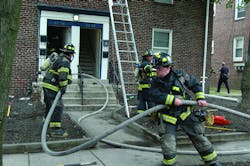Three Simple Ideas to a Healthier Fire Service
This is the second of three columns in which we revisit issues related to attaining the goal of a healthier fire service. The first installment (March 2011) covered effects of stress and overexertion on firefighters. This month, we look at the impact obesity has on firefighters. Our third column will focus on various forms of cancer that may be due to firefighters’ exposure to toxins during their firematic duties.
Obesity is a major health issue for Americans. In fact, obesity is a recognized medical condition with potential for extreme consequences for all firefighters. Obesity is defined as a body mass index (BMI) greater than 30. BMI is a calculation based on height and weight. Firefighters with morbid obesity should not be classified as interior qualified Class A firefighters if their body mass index is more than 40.
Obesity is a contributing factor in many medical conditions, including Type 2 diabetes, stroke, gall bladder disease, arthritis respiratory problems and some cancers. Furthermore, obesity is associated with increased rates of high blood pressure, high cholesterol and cardiovascular disease. Nowhere is the link to diabetes more significant than in the fact that overweight individuals tend to develop Type 2 diabetes at twice the rate of non-obese individuals. In America today, more than 80% of people with diabetes are overweight or obese.
We believe that while Americans in general become more obese, the issue for the fire service is to address this in terms of the obese firefighter’s health and fireground safety of other firefighters. For these purposes, we identify extreme obesity with BMI over 40, otherwise known as morbid obesity, as a life-threatening medical condition.
subhead
Let’s look at some reasons why obesity is such a significant problem for the fire service. As a personal health issue, obesity is a threat to the health and well-being of each individual firefighter. It raises the risk of cardiovascular disease and, ultimately, myocardial infarction, which may occur as a line-of-duty death. Furthermore, because firefighting is a physically demanding activity, it often happens that firefighters’ cardiovascular disease shows itself on the fireground. We cannot afford to put high-risk individuals in situations where they cannot perform and complete their duties. Studies have documented that interior firefighting, stretching hoselines, ladder work, carrying tools and equipment, and other physical tasks require high levels of cardiovascular functioning. Extreme obesity impairs a firefighter’s ability to perform cardiovascular activity and lowers exercise tolerance.
As we engage in this conversation with our fellow firefighters, we use one argument more persuasively than others when it comes to obesity. This issue is when we ask ourselves whether it is fair to put it another firefighter at risk when a morbidly obese firefighter goes down in a structure fire. Can we ask a firefighter of average build and strength to carry a firefighter weighing 300 pounds during interior firefighting operations? This is the issue that resonates most as we discuss implementing this rule.
We believe this discussion may lead to an awareness of severe obesity affecting the safety of fireground operations. We would urge those in the leadership of the fire service to consider giving a one-year notice that going forward firefighters with a BMI greater than 40 will not be permitted to be classified as interior-qualified Class A firefighters.
We advocate that health-and-wellness programs be initiated within the fire service so that firefighters may improve their health, lower their weight and get in shape to remain interior-qualified Class A firefighters. This way, no one feels like they are being singled out and everyone has an opportunity to take responsibility for their own health. We need to be aware that many firefighters will take this personally or will claim that despite their morbid obesity they are in fact the fittest and strongest. Hopefully, their doctors will be able to offer some guidance to improve the health of the firefighters.
A medical policy concerning morbid obesity can be adopted by every fire department to allow for a one-year grace period. No one can expect firefighters with a lifelong history of battling their weight to be able to change things overnight. This policy should be given to the departmental medical officer to implement so that every firefighter is personally told by the doctor what their situation is: Either get fit for duty or you will be categorically excluded from interior-qualified Class A duty.
